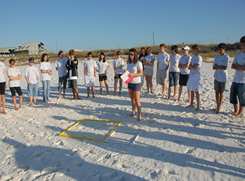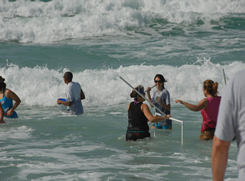THE IMPACT OF THE DEEPWATER HORIZON OIL SPILL
By: Alexing Reddington, Class of 2010
 The Deepwater Horizon spill is one of the greatest man-made disasters in the earth’s history. Thousands of barrels of oil have tragically been poured into our precious and extremely fragile oceanic environment. This toxic chemical is making its way into the ocean’s ecosystem and disrupting the natural processes that millions of species have had for thousands of years. Dolphins, turtles, and jellyfish have been poisoned by this retched carcinogen. Strewn across the beaches, these poor lifeless creatures show the truly devastating effects of this spill. Did they deserve this?
The Deepwater Horizon spill is one of the greatest man-made disasters in the earth’s history. Thousands of barrels of oil have tragically been poured into our precious and extremely fragile oceanic environment. This toxic chemical is making its way into the ocean’s ecosystem and disrupting the natural processes that millions of species have had for thousands of years. Dolphins, turtles, and jellyfish have been poisoned by this retched carcinogen. Strewn across the beaches, these poor lifeless creatures show the truly devastating effects of this spill. Did they deserve this?
 While the Deepwater Horizon spill was unintentional, the havoc it has caused is undeniable. Past research and documentation of our ocean environment is crucial in seeing the true impact of this spill. The NaGISA program has been collecting data in Destin, Florida since the fall of 2003. With the damage done to the coast from the Deepwater Horizon spill, our data is more important than ever. By using our past collections and comparing them to our future collections, we will be able to see the change in the number of species and in the number of individuals of those species.
While the Deepwater Horizon spill was unintentional, the havoc it has caused is undeniable. Past research and documentation of our ocean environment is crucial in seeing the true impact of this spill. The NaGISA program has been collecting data in Destin, Florida since the fall of 2003. With the damage done to the coast from the Deepwater Horizon spill, our data is more important than ever. By using our past collections and comparing them to our future collections, we will be able to see the change in the number of species and in the number of individuals of those species.
The potential sea life devastation brought on by this disaster in unknown at this point. The efforts thus far have been geared towards the clean-up of the spill, as they should be, but not much attention has gone to the microscopic creatures that allow our ecosystem to function as it does. These microscopic organisms are the keystone species to our environment. Micro and macro fauna account for the majority of our area’s primary consumers and because of this are the primary food sources to many of the fish tourists flock to see. With the absence of micro and macro fauna, a lack in fish will not be far behind, and as this shortage works its way up the food chain, our oceans will soon be empty.


